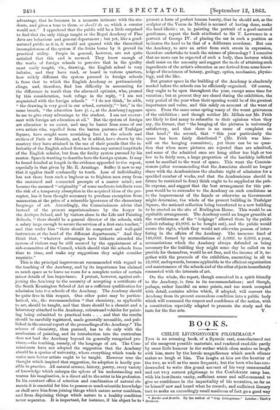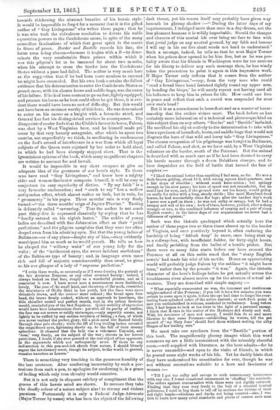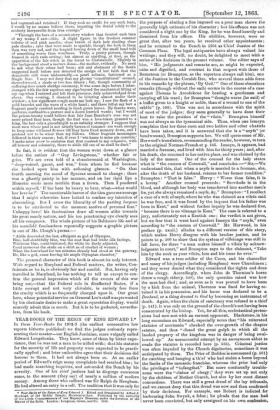BOOKS.
CHILDE LIVINGSTONE'S PILGRIMAGE.*
THIS is an amusing book, of a Byronic cast, manufactured out of the meagrest possible materials, and rendered readable partly by some little humour in the author which often makes us laugh with him, more by the heroic magnificence which much oftener makes us laugh at him. The laughs at him are the heartier of the two, as well as the more frequent; but the hero who has con- descended to write this grand account of bis very unsuccessful and not very earnest pilgrimage to the Confederate camp has, with his inordinate vanity, sufficient sense and self-command to give us confidence in the impartiality of his narrative, so far as he himself saw and heard what he records, and, sufficient literary tact to make an exceedingly small modicum of fact go a good. way • Border cad-Bastille. By the author of "Guy Livingstone." London: Tinsley Brothers.
towards thickening the abstract beauties of his heroic style.
It would be impossible to forget for a moment that it is the gifted author of "Guy Livingstone" who writes these pages ; that he
it was who took the chivalrous resolution to devote his noble equestrian powers to the Confederate cause, in spite of the many masouline fascinations of which that great spirit is the centre in times of peace. Border and Bastille records his fate, the latter term being chosen—because it begins with a B —to deno- minate the very comfortable State prison within which it was this pilgrim's lot to be immured for about two months, when his attempt to cross the border into the Confederate States without a pass had failed. The author is very much hurt at the suggestion that if he had been more anxious to succeed he might have succeeded. But his own book contains the fullest evidence that his determination to enter the Confederate States en grande tenue, with his chosen horse and saddle-bags, was the cause of his failure. If he had been content to go on foo t, lightly equipped, and procure his horse as he hest could when he got there, it is evi- dent there would have been no sort of difficulty. But this would not have been an entrance worthy of this hero. He was determined to enter on his career as a knight with a favourite steed, and General Lee lost his distinguished services in consequence. The disappointed reader finds that the Childe's favourite horse, Falcon,
was shot by a West Virginian boor, and he himself made pri-` soner by that very homely antagonist, after which he spent two months, not unprofitably we think, in meditating in confinement on the fool's errand of interference in a war from which all loyal subjects of the Queen were enjoined by her order to hold aloof, in which he had been abruptly stopped short. That is the ignominious epitome of the book, which many magnificent chapters are written to account for and bewail.
It would be impossible in any short compass to give an adequate idea of the greatness of our hero's style. To those who have read "Guy Livingstone," and know how a mighty rider and woman-fascinator comports himself, it will be easy to conjecture its easy superiority of diction. "By my faith" is a very favourite exclamation; and " sooth to say" has a mellow antiquarian effect, which almost makes us look, but in vain, for
grammercy " in his pages. Three months' rain is very finely turned—" the three months' reign of Jupiter Pluvius." Tasting is delicately called " savouriug." That the author is not much past thirty-five is expressed classically by saying that ho has "hardly entered on his eighth lustre." The ankles of young ladies are described with fine Johnsonian effect as their "pedal perfections," and the pilgrim cpmplains that they were too often draped even from his admiring eyes. Not that the young ladies of Baltimore—or of any place—fought shy of him,—they evidently worshipped him as much as he would permit. He tells us how be clasped the "willowy waist" of one young lady for the waltz ; of the "irrideseent eyes, the sweet indolent ntorbidezza" of the Baltimore type of beauty ; and, in language even more rich and full of majestic connoisseurship than usual, he gives 113 his one glimpse of a lady of "supreme perfection."
"I write these words, as reverently as if I were drawing the portrait of the fair Austrian Empress, or any other crowned beauty: indeed, I always looked on that face, simply as a wonderful picture, and so I remember it now. I have never seen a countenance more faultlessly lovely, The pose of 'he small head, and the sweep of the neck, resembled the miniatures of Giulia Grisi in her youth, but the lines were more delicately drawn, and the contour more refined ; the broad open fore- head, the brows firmly arched, without an approach to heaviness, the thin chiselled nostril and perfect mouth, cast in the softest feminine mould, reminded you of the first Napoleon. Quick mobility of expression would have been inharmonious there : yet with all its purity of outline, the face was not severe or coldly statuesque,—only superbly serene, not lightly to be ruffled by any sudden revulsion of feeling ; a foes, of which you never realized the perfect glory, till a pink-coral tint flushed faintly through clear pale cheeks ; while the lift of long trailing lashes revealed the magnificent eyes, lightening slowly up, to the full of their stormy splendour. It chanced that the Lady was a vehement Unionist, and • rose,' very freely, on the subject of the war ; sincere in her honest patriotism, I doubt if she ever guessed at the real object of her opponent, in the arguments which not unfrequently arose. If there be any indiscretion in this pen-and-ink sketch from nature, I should bitterly regret the involuntary error, though its subject, to the world in general, remains nameless as Lenore."
There is something very touching in the generous humility of the last sentence. After conferring immortality by such a por- traiture from such a pen, to apologize for conferring it, is a grace of feeling which only true chivalry would conceive.
But it is not only in eloquent subtlety of compliment that the graces of this heroic mind are shown. In menace they take the deadly colour of a nature subject alas! to stormy and violent passions. Fortunately it is only a Federal Judge-Advocate (Major Turner by name) who has been the object of the foliowing
dark threat, yet his reason itself may probably have given way beneath its gloomy shadow :—".During the latter days of my imprisonment, I indulged more than once in a day-dream, not the less pleasant because it is wildly improbable. Should the changes and chances of this mortal life ever bring me face to face with
that jovial judge on any neutral ground, by my faith and honour 1 will say in his ear five short words not hard to understand."
Such a message, indeed, he tells us that he sent Major Turner
when his prison-door opened to let him free, but as he was pro- bably aware that his friends in Washington were far too anxious
for his liberty to deliver any such message then, he has wisely taken the precaution to print it again in this impressive work. If Major Turner only reflects that it comes from the author of Guy Livingstone,"—nay, from the very man who could "rend a broad linen band fastened tightly round my upper arm, by bending the biceps," lie will surely repent not having used all his influence to keep him in prison for life. How could one live in peace and reflect that such a sword was suspended for ever over one's bead?
But it is as a connoisseur in horseflesh and as a master of horse- manship that the author shines most. The book before us has certainly more information of a technical and picturesque kind on this subject than on any others, "Border" and "Bastille" included. He sacrificed his object entirely to the determination to take with him a specimen of horseflesh, boots, and saddle-bags that would not disgrace the hero of that wild and horsy tale "Guy Livingstone." The chosen companion of his pilgrimage was bought in Baltimore, and called Falcon, and shot, as we have said, by a West Virginian volunteer on the border, south of the Potomac. But the animal is described with as much care as if he had been doomed to cany his heroic master through a dozen Balaklava charges, and to bear despatches on the field of battle that turned the fate of e mpires
" I liked the animal better than anything I had seen, so far. He was a dark-brown gelding, about 15.3, with strong square hind-quarters, and a fair slope of shoulder; without much knee-action ; but springy enough in his slow paces; his turn of speed was not remarkable, but he could last for ever, and, if the ground were not too heavy, would gallop on easily for miles with a long, steady stride ; like most Maryland-bred horses, he had wonderfully clean flat legs; after the hardest day's work I never saw a puff on them ; he was not sulky or savage, but he had a temper and will of his own ; both of these, however, yielded, after a sharp wrangle or two, to the combined influence of coaxing and a pair of sharp English rowels; in the latter days of our acquaintance we never had a difference of opinion."
Such was the historic quadruped which actually bore the author of these pages two or three times almost up to the border of Virginia, and once positively beyond it, often enduring the hardship of being "fetlock deep" in snow, once being shut up in a railway-box, with insufficient fodder, for forty-eight hours, and finally perishing from the bullet of a hostile picket. But there were so many false starts before our hero crossed the Potomac at all on this noble steed that the "sharp English rowels" had made fair trial of his mettle. Hence an appreciating world will probably judge Falcon by the sublime "it might have been," rather than by the prosaic "it was." Again, the historic character of the hero's feelings before he got actually across the troublesome river almost makes up for the absence of actual ad- venture. They are described with simple majesty :— " What especially exasperated me wax, the incessant and continuous neighbourhood of the Potomac ; if you left it for a few minutes you were certain to come upon it again, before the eye had time to forget the ever- lasting foam-splashed ochre of the sullen current; at each fresh point it met you undiminished in volume, unabated in turbulency. Long before this, I had begun to look at the river in the light of a personal enemy. I think that Xerxes in the matter of the Hydaspes did wisely and well. With his resources of men and money, I would fain do so and more likewise to that same Potomac—subdividing its waters, till the pet spaniel of' my Mary Jane' should ford them without wetting the silky fringes of her trailing ears."
We must take one specimen from the "Bastille" portion of this book. The magnificently gloomy images which this word summons up are a little inconsistent with the tolerably cheerful room,—well supplied with literature, as the hero admits—for he is never uncandid—and open to the visits of friends, in which he passed some eight weeks of his life. Yet he darkly hints that they have undermined his constitution for ever, though be was not without recreations suitable to a hero and fascinator of women :—
" Till I got too sulky and savage to seek unnecessary intercourse with any one, I found occasional amusement in chaffing ' the sentinels. The orders against conversation with these were not rigidly enforced_ Finding that they rose very freely to the bait of a strained ironical politeness, I used to beg them to tell off by sections the victims of their red right hands—chickens and ducks not being counted—also, I was fain to learn how many rebel standards and pieces of cannon each man
had captured and retained ? If they took no credit for any such feats, I would by no means believe them; imputing the denial solely to the modesty inseparable from true courage."
"Through the bars of a second-story window that fronted each turn of my tramp I saw—this. A slight figure in the freshest summer toilette of cool pink muslin ; close braids of dark hair shading clear pale cheeks ; eyes that were made to sparkle, though the look in them then was very sad, and the languid bowing down of the small head told of something worse than weariness. Truly, a pretty picture, though framed in such rude setting ; but almost as startling, at first, as the apparition of the fair witch in the forest to Christabelle. Slightly in the background stood a mature dame—the mother, evidently. No need to ask what their crime had been ; aid and abetment of the South suggested itself before you detected the ensign of her faith that the demoiselle still wore undauntedly—a pearl solitaire, fashioned as a Single Star. I may not deny that my gloomy constitutional' seemed, thenceforward, a shade or two less dreary ; but, though community of suffering does much abridge ceremony, it was some days before I inter- changed with the fair captives any sign beyond the mechanical lifting of my cap when I entered and left their presence, duly acknowledged from above. One evening, I chanced to be loitering almost under their window ; a low significant cough made me look up ; I saw the flash of a gold bracelet and the wave of a white hand ; and there fell at my feet a fragrant pearly rosebud nestling in fresh green leaves. My thanks were, perforce, confined to a gesture and a dozen hurried words ; but I would the prison-beauty could believe that fair Jane Beaufort's rose was not more prized than hers, though the first was a love-token granted to a king, the last only a graceful gift to an unlucky stranger. I suppose that most men whose past is not utterly barren of romance are weak enough to keep some withered flowers till they have lived memory down, and I pretend not to be wiser than my fellows. Other fragrant messengers followed in their season ; but, if ever I 'win hame to mine sin countrie,' I make mine avow to enshrine that first rosebud in my reliquaire, with all honour and solemnity, there to abide till one of us shall be dust."
In fact, it is evident that the women went down at a glance before the author of "Guy Livingstone," whether fair or grim. We are even told of a chambermaid at Washington, "deep-voiced, gaunt, and wan," front whom he fled because she looked upon him with softening glances. "On that fourth morning the mood of Sycorax seemed to change ; there was a ghastly gaiety in her manner, and on her rigid lips a Homeric smile more terrible than a frown. Then I pondered within myself, If her hate be heavy to bear, what—what would her love be ?' The unutterable horror of the idea gave me courage that I might otherwise have lacked to confess my intention of absconding. But I avow the liberality of the parting largesse is to be attributed to the meanest motive of personal fear." Unhappy hero ! his fascinations draw all women alike towards his great manly nature, and his too penetrating eye clearly sees all his conquests. The whole picture of his Baltimore life and of
• his manifold fascinations repeatedly suggests a graphic picture in one of Mr. Clough's poems :—
" Airlie descended the last, effulgent as god of Olympus, Blue, half-doubtfully blue, was the coat that had white silk facings, Waistcoat blue, coral-buttoned, the white tie finely adjusted, Coral moreover the studs on a shirt as of crochet of women ; When the fourwheel for ten minutes already had stood at the gateway, Ho, like a god, came leaving his ample Olympian chamber,"
The personal character of this book is ahnost its only interest. With regard to Maryland and Federal matters, the writer, Con- federate as be is, is obviously fair and candid. But, having only travelled in Maryland, he has nothing to tell us except to con- firm the general impression which all the events of this war bring out,—that the Federal rule in disaffected States, if a little corrupt and not very chivalric, is entirely free from the cruelty which is so frequently charged upon it. Our great hero, whose potential service on General Lee's staff was prevented by his obstinate desire to make a great equestrian display, would scarcely admit this in words. But it is to be gathered, neverthe- less, from his book.




































 Previous page
Previous page